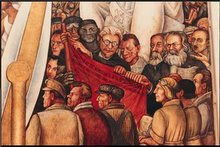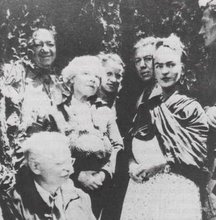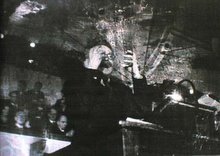WHAT THE MARCH 31ST 2007 RALLY FOR JOHN MCDONNELL INDICATES ABOUT THE PERIOD?
1. A TRANSITIONAL PERIOD COMING OUT OF PAST WORKERS DEFEATS IN BRITAIN IS COMING TO AN END AND POSSIBILITIES OF MASS STRUGGLES.
What Thatcherism and Blairism has achieved for the Ruling Class is coming to an end. The masses (as I argued in the ISG when I was a member from 1997-2002) had rejected Thatcherism and wanted a return to Social Democratic policies. For a whole number of historical factors the Trade Union Bureaucracy (which I analyse later in this document) and layers of Social Democracy managed to stop mass resistance by millions of workers.
Due to the masses hatred of Blair since the 2003 Iraq war he had to rely on more ruling class support to survive. It’s absolutely astonishing with the extent of mass feeling for change what he has got away until his third term started in May 2005. Marxists should not be surprised with such glaring contradictions. Trotsky taught our movement that in the dialectics of history the opposites reflecting contradictory forces inter-relate and eventually come in violent conflict.
One reason that the radicalisation is deepening among millions of organised workers is that the Blairites are confrontational towards the rest of the labour movement. This has been a tendency since the 2nd term. As I stated previously the Iraq war accelerated this process. The last coalition which Blairism had with right wing Social Democracy was to win that 2005 general election.
2. RULING CLASS DUMPING BLAIR AND TWO FACTORS IN THE BRITISH LABOUR MOVEMENT WHICH IS LEADING TO THE DEFEAT OF BLAIRISM.
There are three inter-connected factors which are influencing the crisis in Blairism and the Labour Party. Understanding these complex contradictory factors is the only way Trotskyists can work out effective tactics. The majority of British Ruling Class elements despite their anger how he has weakened Capitalism with the Iraq adventure used him to see what he could get away before the Labour Party’s base reacted.
These ruling class elements want him out due to them facing the backlash of rising world revolution and increasing radicalisation. Most ruling class elements want a Blairite to challenge Brown because despite his pro-Capitalist policies his base is more Social Democratic and they are frightened he may have to make concessions or be overthrown.
If McDonnell was a threat they would these different ruling class factions would have closed ranks behind Brown. These ruling class elements are resisting the return of Social Democracy because with the deep structural crisis of Capitalism it would impinge too much on their profits. This means that past gains can only be defended through mass struggles which potentially threaten Capitalism.
The dialectical paradox is that the ruling class have had so many victories and got away with so much without a price being extracted it is blinding them to class pressures which are already causing a radicalisation and could possibly develop into mass upheavals. Dialectically the more ruling class elements think they are winning, its opposite in the form of growing opposition is deepening and at some point cause a mass struggle/s. One victory won by big class conflict would probably open up a flood of other struggles.
One factor has already been mentioned the growing provocations which the Blairites have to both organised and unorganised workers. This is making it more difficult for Trade Union Bureaucrats and Social Democrats to contain potential upheavals. The Blairites are not giving the Trade Union Bureaucrats and Social Democrats to play their role of conciliating and manoeuvring between the classes. Trade Union Bureaucrats are playing their treacherous role of making sure Brown does not face a serious left opposition. At the same time they are forced to call a day of action on May Day to oppose health policies.
3. THE LANDSLIDE VICTORY FOR LABOUR IN 1997 GENERAL ELECTION REPRESENTED BEGINNING OF A MASS RADICALISATION,
There was an undocumented dispute (I defended my analysis in a 2000 pre-aggregate internal bulletin on electoral tactics for 2001 General Election) within the Birmingham ISG Branch over whether the 1997 election represented a radicalisation. Stuart Richardson’s main argument for denying a radicalisation was the absence of immediate mass workers struggles.
Trotsky argued against such formalism in his late 1920s and early 1930s writings on what constituted a radicalisation. Social Democrats in France used similar arguments of Richardson who similarly denied radicalisation due to absence of mass struggles. For Trotsky what constituted a radicalisation was a feeling or a struggle by workers; the oppressed; and some middle class elements against certain Capitalist policies. This could reflect itself in politics; industrial action; and social struggles. Elections he argued could be one form of political radicalisation.
Trotsky argued that whether a radicalisation deepens; declines; or growth of contradictory reactionary trends is what form the radicalisation has taken and whether hope or disillusionment grows among the masses. Due to workers defeats in the 1980s through major strike battles the Trade Union Bureaucrats arguments against effectiveness of strikes hegemonised whole layers of Trade Unionists. Those Bureaucrats asked their rank-and-file members to be patient and wait for a Labour government to rectify their problems. Middle class elements started demonstrating against cuts in schools. Millions of workers and middle class elements hoped that Labour would improve their lives.
The middle class elements who/have politicises have gone in different directions. There are some elements of this class who have led anti-globalisation protests and gone into the ant-war since 9/11 attacks. Reactionary tendencies have also grown among some other middle class layers. This is reflected in the growth of right wing populist forces UKIP during the 2004 European Elections and limited inroads of the Fascist BNP. When those youth attacked the stock market in June 1999, this was seen by the ruling class as an anticipation of what could happen to them if millions of workers and middle class elements did something similar in the future. In other words they feared revolution. To counter this threat Conservative Bourgeois elements were allowed to promote xenophobia and racism.
Due to the disillusionment with Blarism combined with the failure of the organised working class to assert themselves there has caused despair among middle class and unorganised workers. This would be a passing phrase if workers begin to fight and promote pro-workers answers to Capitalism’s problems. An indication of this was the broad workers and middle class support for the Firefighters strikes in 2002-3.
The huge protests against war on Iraq has mobilised workers; middle class layers; and elements of oppressed ethnicities. This has deepened the radicalisation against Imperialism. When other struggles break out some of these forces may come together. An indication of this is the rally for McDonnell on March 31st 2007. If the Liberal Bourgeoisie hadn’t adapted to this movement by Kennedy going on that demonstration in February 2003 politics could have moved to the left of Bourgeois politics and Blairism. The impact of this movement could have weakened UKIP’s and BNP’s ability to grow by dividing and ruling.
4. THE BATTLES BY WORKERS AND OPPRESSED AGAINST BROWN WILL DETERMINE WHETHER RADICALISATION DEEPENS OR REACTIONARY TENDENCIES INCREASE AMONG MIDDLE CLASS AND LUMPEN PROLETARIAN ELEMENTS.
These two big radicalisations have not been effectively used by revolutionaries due to opportunism and Ultra-Leftism of centrist forces. This problem goes back decades and can be traced to the break-up of the Revolutionary Communist Party in 1947-1950 where ex-Trotskyists began to break from Trotskyism. International and domestic problems will help to forge a Trotskyist cadre as objective conditions will give rise to this politics. Trotskyism will grow by linking up with millions of workers as they fight Brown through the Unions and political fights it will cause in the Labour Party.
Brown in the short-term will attempt to keep wage cuts among public sector workers. This is already leading to calls for strike action. The PCS is going on strike against privatisation and tens of thousands redundancies. There are other unions are considering taking solidarity action. Two processes are at work. It indicates that public sector workers are going to work together to fight Brown’s policies and could even develop into a one day general strike by these workers. Trade Union Bureaucrats could utilise this mood to bargain with Brown.
At the local elections because this workers action won’t kick in onto election day and after it won’t halt the centrifugal tendencies which could be expressed in this election. In Scotland there is a danger of the SNP winning at least the biggest number of seats to the Scottish parliament. They are being quite demagogic in promising to scrap loans and student debt, alongside restoring full grants. There are dangers that the Conservative Party could make further gains by capitalising on hatred towards Blair. The BNP will attempt to make further inroads. If they make too many gains it could provoke a reaction among organised workers and among oppressed ethnicities.
The resurgence of Social Democracy within Labour is seen by what the Walsh Labour Party is campaigning for election to the Walsh assembly. They are promising to have free proscriptions. John McDonnell’s rally on March 31st shows that workers; alongside women fighting Sexism; and oppressed ethnicities struggling against Racism are coming behind him in his struggle to be leader.
This is a deepening of a radicalisation that began in the early 1980s where there were struggles for Women and Black caucuses. It is positive these forces are coming together despite being led by left wing Social Democrats. These three forces the organised working class; women; and oppressed ethnicities are coming together to begin a fight against Capitalism. Trotskyists should orientate to this form of radicalisation and win considerable numbers to an ultimate break from Social Democracy. If this policy is successfully applied a mass revolutionary party could be established.
This development around McDonnell shows how to unite the workers and oppressed. It shows the bankrupt policies of Popular Frontism carried out by SWP and Galloway with certain Bourgeois reactionary Islamic forces. Due to these alliances they can’t consistently defend workers; women; and gays/lesbians. As those workers and oppressed deepen their struggles Respect will break up among its fault-lines. The SWP have gone from one form of opportunism to another kind. They went from opposing struggles for positive action to know unprincipled alliances with Islamic Bourgeois forces. It is correct for Trotskyists to support positive action for oppressed groups. By championing these demands the oppressed can be won to the workers side.
If there is a rise in workers struggles it could dramatically weaken the reactionary tendencies. Millions of workers going on strike against pay cuts and privatisation of public services will expose the Bourgeois parties. In Belgium the Fascist vote were dramatically cut due to workers occupying a Volkswagen plant. The Fascists lost votes by calling for that plant to close down. Mass struggles by workers could shake the Labour Party up and possibly begin to split it. This could keep the Labour Party in power at the next general election and forces to its right could be weakened. Left Wing Social Democracy under these circumstances could take the Labour Party or there could be a sizeable left split under pressure of huge class battles.
5. THE INTERNATIONAL DEVELOPMENTS WHICH COULD INFLUENCE BRITISH SITUATION.
Revolutionary upheavals in Latin America, especially the revolutionary process unfolding in Venezuela are having a huge impact on radicalising forces. Trotskyists should circulate to British workers similar struggles which are unfolding in Western Europe. The British ruling class keep this quiet because if the effectiveness of these struggles were widely known mass struggles would break out faster.
The French Presidential elections could have a big impact if Royale wins. Royale has promised big reforms for workers. Irrespective of whether she implements these reforms, workers there will have big expectations of change which could even lead to bigger struggles by them. Her victory could strengthen Social Democratic tendencies within the British Labour Party.
China’s massive economic development shows the alternative to Capitalism of what a Workers’ State can accomplish. This is why the British Ruling Class through its media is finding every weakness in China to undercut an ideological rival. The Chinese Bureaucracy does not want extension of world Socialist revolution. Imperialism understands this but they utilise their weaknesses to undermine ideologically the economic base which poses an alternative to Capitalism.
6. TWO WEAKNESSES AT MCDONNELL RALLY AND HOW A TROTSKYIST ORGANISATION WILL BE FORGED.
Two problems with the rally was hostility to Mugabe and Stalinphobia towards Putin. Mugabe is a Bourgeois Nationalist which workers should oppose. In this context he is expropriating aspects of Imperialist owned land which should be supported. Trotsky argued in 1938 that Bourgeois Nationalists in semi-Colonies have a dual character. They are both exploited and exploiters. Imperialism exploits them and Bourgeois Nationalists exploit workers.
Any anti-Imperialist action should be supported by Trotskyists. We take advantage of this Bourgeois Nationalist and Imperialist divide to strengthen the workers. By understanding the Permanent Revolution we know that only the working class can end Imperialist rule in Zimbabwe because the Bourgeois Nationalists will make a deal with Imperialism because they fear workers the most. I instinctively felt there was a layer not distancing themselves sufficiently from Imperialist attacks on Mugabe.
Putin is carrying out terrible Stalinist crimes in Chechnya. Somebody at the rally got up and said that Putin “is carrying out Western interests in Chechnya”. This is a completely wrong analysis. As always the Russian Bureaucracy is both oppressing Chechnyans and crushing pro-Imperialist elements. Imperialism was furious when Russia re-entered Chechnya because they hoped the oil resources would fall into their hands. As the Cold War deepens between the Russian Workers’ State and Imperialism there will be more recognition of the dual nature of Russian Stalinism.
No process is completely perfect. This is why a revolutionary party is built around a rounded programme which sees all the complexities internationally and in Britain.
Tuesday, 10 April 2007
Subscribe to:
Comments (Atom)


